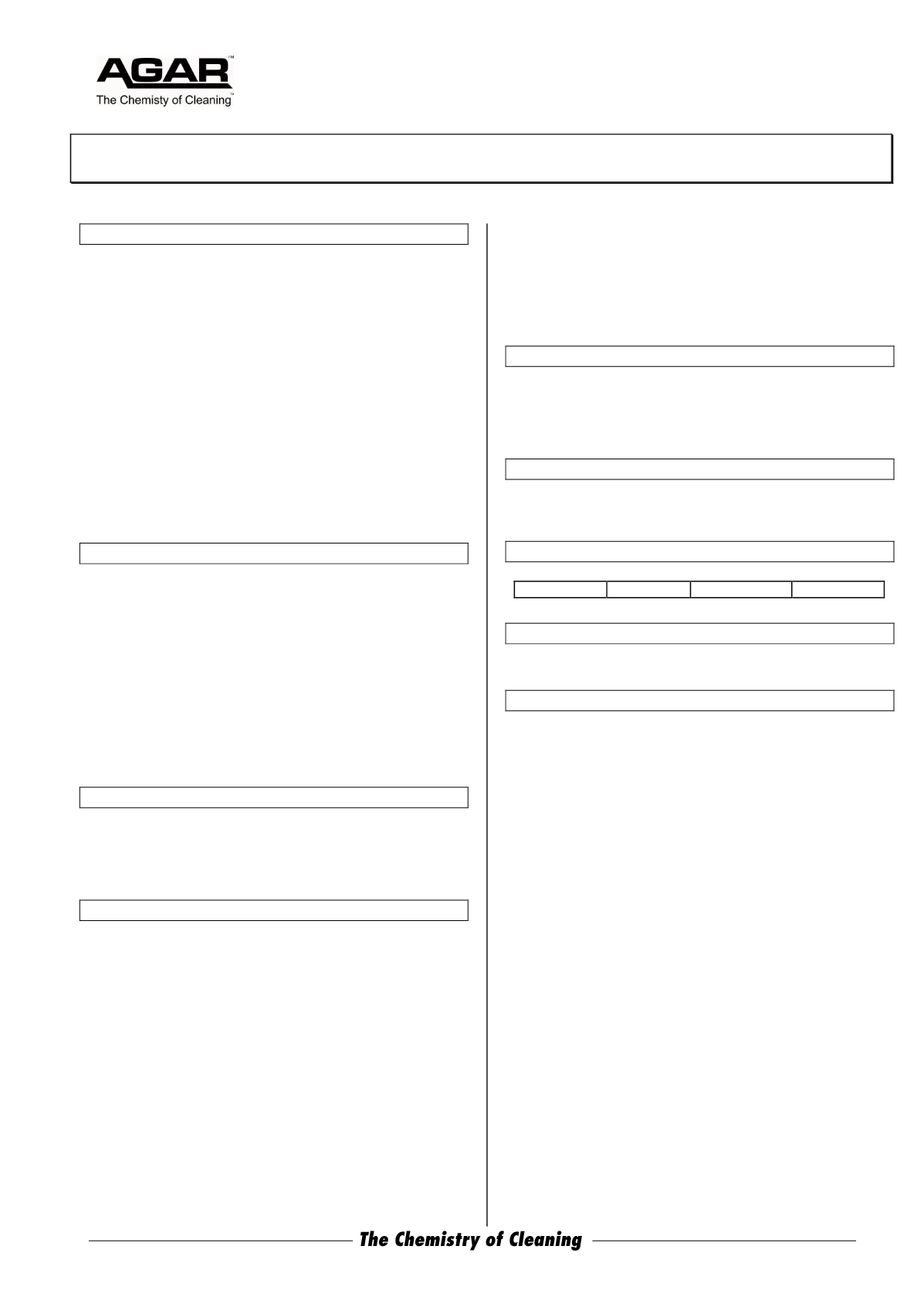

ABN 80 004 726 890 | MADE IN AUSTRALIA
Safety Data Sheet
Issued: April 16, 2013
Page 2 of 2
PENETRATING OIL
8 EXPOSURE CONTROLS / PERSONAL PROTECTION
Exposure Standards: None assigned for mixture or individual
ingredients by Worksafe Australia. Other Standards: (Data
for principal ingredient)
Suggested TLV (for kerosene) = 200 ppm
(Shell Occupational Exposure Limit for 8-hour working day,
5 days a week)
Engineering Controls: Mechanical ventilation: Flameproof
ventilation (local exhaust and/or general mechanical) is
required if sufficient product is used to generate volumes of
vapour that approach the flammability or TLV limits. No
smoking. Use in a well ventilated area.
Personal Protection:
Gloves - Wear neoprene or nitrile gloves.
Note: Resistance of glove materials can vary. Evaluate
resistance under conditions of use and maintain PPE
carefully.
Eye-protection - Not normally required.
9 PHYSICAL AND CHEMICAL PROPERTIES
Appearance: Clear colourless liquid
Odour: Kerosene-type odour
pH = Not applicable
Vapour Pressure: Approx 0.7 kPa (20ºC)
Vapour Density: 4.5 (air = 1) (15ºC)
Boiling Point: 159 - 234
°
C
Freezing Point: < 0
°
C
Flash Point: 54 deg C (COC)
Flammability Limits : N/K
Solubility in water: Insoluble
Specific Gravity: 0.80 (20ºC)
Evaporation rate = c.0.16 (n-butyl acetate = 100)
% Volatile by vol: > 50%
10 STABILITY AND REACTIVITY
Flammability: Penetrating Oil is flammable. Avoid all ignition
sources. May form explosive mixtures with air.
Hazardous polymerization: Will not occur.
11 TOXICOLOGICAL INFORMATION
Health Effects:
Acute
–
Swallowed: Ingestion may cause solvent aspiration into the
lungs which may cause mild to severe pulmonary injury and
possibly death.
Eye: Eye contact may cause irritation.
Skin: Principal route of exposure is usually by skin contact.
Moderate irritant to the skin on prolonged contact.
Inhaled: Harmful. Inhalation may cause moderate irritation to
the respiratory tract and mucous membranes. Inhalation of
high vapour concentrations may cause headaches and
dizziness, are anaesthetic and may cause central nervous
system depression.
Health Effects -
Chronic
:
Repeated or prolonged skin contact may cause swelling,
redness, blistering or dermatitis. Chronic exposure to the
concentrated vapour may result in headache and symptoms
of central nervous system depression.
Toxicity Data: Not available for mixture.
Data for Kerosene: practically non-toxic
(oral LD50 and Dermal LD50 > 2000mg/kg).
(Note: this data is from published information. Agar Cleaning
Systems does not carry out animal tests).
12 ECOLOGICAL INFORMATION
Ecotoxicity: No data available.
Persistence and degradability: -
Mobility: -
Advice: -
13 DISPOSAL CONSIDERATIONS
For disposal, refer to State Land Waste Management authority.
14 TRANSPORT INFORMATION
UN No.: 1993
Class: 3
Pack. Group: III Hazchem: 3[Y]
15 REGULATORY INFORMATION
Poisons Schedule Number: Schedule 5.
16 OTHER INFORMATION
AICS Listing:
All components of Penetrating Oil are listed on
the Australian Inventory of Chemical Substances (AICS).
Date: This SDS issued: April 16, 2013
Abbreviations: N/K = Not Known
TWA = Time Weighted average
STEL = Short term exposure limit
CAS = Chemical Abstracts Service
The information in this Data Sheet is based on our present
knowledge. However, this shall not constitute a guarantee for
any specific product features and shall not establish a legally
valid contractual relationship. Agar Cleaning Systems accepts
no tortious or contractual liability for any loss or damages
suffered as a consequence of reliance on the information and
advice contained herein.
End of SDS.


















